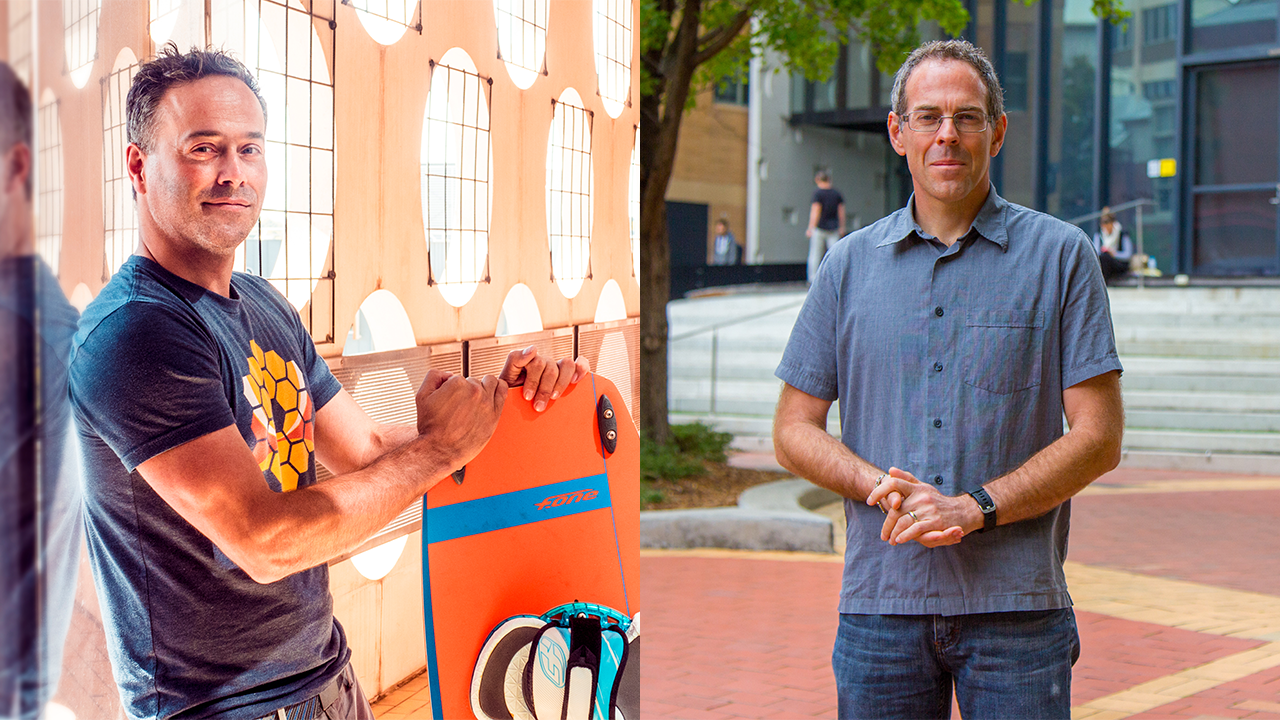$2M Future Fellowships awarded to star-powered researchers

Swinburne Centre for Astrophysics and Supercomputing researchers, Associate Professor Ivo Labbe (left) and Professor Darren Croton (right) have been awarded Australian Research Council (ARC) Future Fellowships
In summary
- Two Swinburne astrophysicists have been awarded Australian Research Council (ARC) 2022 Future Fellowships
- Associate Professor Ivo Labbe is finding the first stars and galaxies that formed after the Big Bang using the $14 billion James Webb Space Telescope
- Professor Darren Croton will create supercomputer simulations of several billions of galaxies to uncover new knowledge about our universe
Two Swinburne astrophysicists have been awarded Australian Research Council (ARC) Future Fellowships amounting to over $1 million each.
The four-year Future Fellowships support mid-career researchers to undertake high quality research in areas of national and international benefit, such as cybersecurity, energy, resources and advanced manufacturing.
Swinburne’s Deputy Vice-Chancellor, Research, Professor Karen Hapgood, was quick to share the achievement.
“Congratulations to our two newest Future Fellows, Professor Darren Croton and Associate Professor Ivo Labbe – both from Swinburne’s Centre for Astrophysics and Supercomputing,” said Professor Hapgood.
“Swinburne is proud to be an engine room for research excellence and innovation in astrophysics and aerospace, boasting internationally competitive research infrastructure on campus including the Australian James Webb Data Centre and Swinburne's recently upgraded supercomputer. It is wonderful to see our world-leading Centre for Astrophysics recognised for the impact of their ground-breaking research."
Shining a light on the first stars and galaxies
It has already been a big year for Associate Professor Labbe, who was one of the few researchers globally to secure precious time in the first observation of the A$14 billion James Webb Space Telescope (JWST). With the first data sent back in July, it is no surprise that Associate Professor Labbe was able to impress with out-of-this-world research.
“JWST is already turning out to be a true discovery machine, showing us the early Universe is very different than expected,” he said.
“Perhaps the most exciting part to me is the potential to discover things we have not even imagined yet.”
His project, ‘Uncovering the First Stars and Galaxies with the James Webb Space Telescope’, aims to find the first stars and galaxies that formed after the Big Bang.
Understanding the astrophysics of the first galaxies, their explosive growth and how they set ablaze the remaining gas in the Universe have long been among the most important unsolved mysteries of astronomy.
Decades in the making, the launch of JWST marked a watershed moment. This project uses privileged access to the revolutionary space telescope to find ‘First Light’ and contribute to rewriting the first chapter of our cosmic history. It is expected to significantly enhance Australia's reputation in space science.
Associate Professor Labbe was awarded $1,055,476 for the project.
Delving further into a recent discovery
Quiescent galaxies are those that have lived a long and full life and are in the process of dying or are long since dead; ancient relics made up of billions of old stars. They are rare but familiar in the local Universe and well-studied.
In contrast, distant early-Universe massive quiescent galaxies are a surprising recent discovery, with some such galaxies having taken just a billion years to somehow become what took their local counterparts the Universe’s entire 14-billion-year history.
Unravelling how such exceptional galaxies came to be is the focus of Professor Darren Croton’s project, ‘The many lives and deaths of high redshift massive quiescent galaxies’, which saw him awarded a $1,055,476 Future Fellowship.
At the core of this project is the unique combination of high-performance computing, software engineering and sophisticated data analysis techniques. We expect to see Professor Croton develop novel and improved supercomputer simulations of several billions of galaxies processed through a virtual observatory, which will provide tools and fundamental knowledge for observational, theoretical and computational astrophysics around the world.
“It’s an exciting time for theoretical astrophysics,” said Professor Croton.
“Using Swinburne’s OzStar supercomputer and its 2023 next-generation upgrade Ngarrgu Tindebeek ("Knowledge of the Void"), these simulations of massive quiescent galaxies will allow us to explore their origin and entire history in unprecedented detail. We will be able to answer the questions “how?” and “why?”, something even the world’s best telescopes can’t do.”
This year, the ARC provided $94 million in funding to attract and retain the best and brightest mid-career researchers.
-
Media Enquiries
Related articles
-

- Astronomy
High school students work with Swinburne astronomers on the future of space
Swinburne’s Youth Space Innovation Challenge has inspired over 330 Australian teenagers to pursue a career in STEM.
Friday 26 July 2024 -

- Astronomy
- Science
Swinburne appoints new Director of Innovative Planet Research Institute
Leading geodesy expert, Professor Allison Kealy, has been appointed as the inaugural Director of Swinburne University's Innovative Planet Research Institute.
Monday 22 April 2024 -

- Astronomy
- University
OzGrav 2.0: A ‘new era of astrophysics’ launched at Swinburne
The next phase in the world-leading ARC Centre of Excellence for Gravitational Wave Discovery, dubbed 'OzGrav 2.0', launched this week at Swinburne University of Technology.
Wednesday 17 April 2024 -

- Design
- Astronomy
- Technology
- University
Swinburne ‘Rock Muncher’ takes part in Australian Rover Challenge
A multidisciplinary student team from Swinburne University of Technology competed in the 2024 Australian Rover Challenge held in Adelaide, South Australia.
Thursday 11 April 2024 -
.jpeg/_jcr_content/renditions/cq5dam.web.256.144.jpeg)
- Astronomy
New JWST observations reveal black holes rapidly shut off star formation in massive galaxies
New research showcases new observations from the James Webb Space Telescope that suggest black holes rapidly shut off star-formation in massive galaxies by explosively removing large amounts of gas...
Tuesday 23 April 2024

